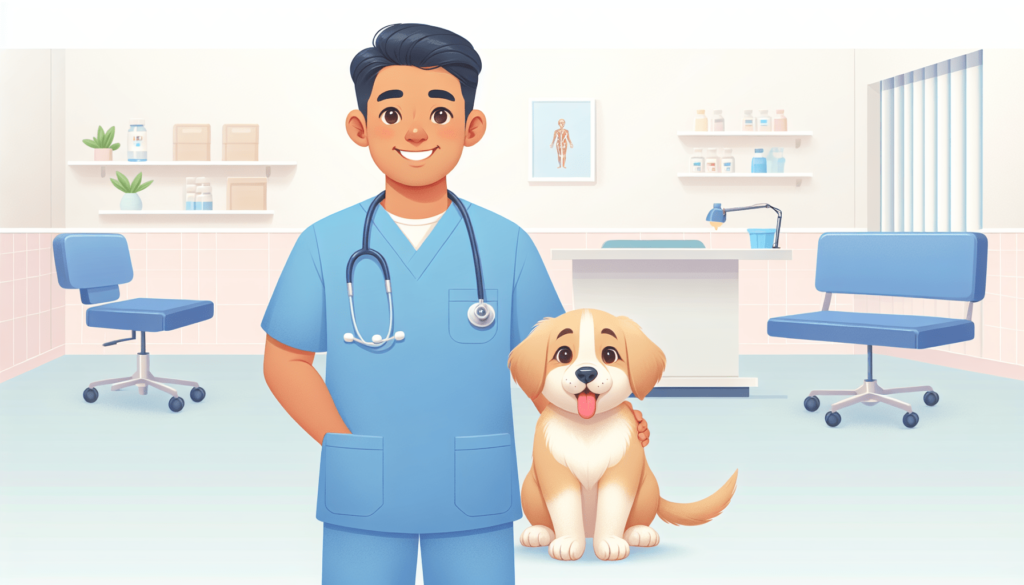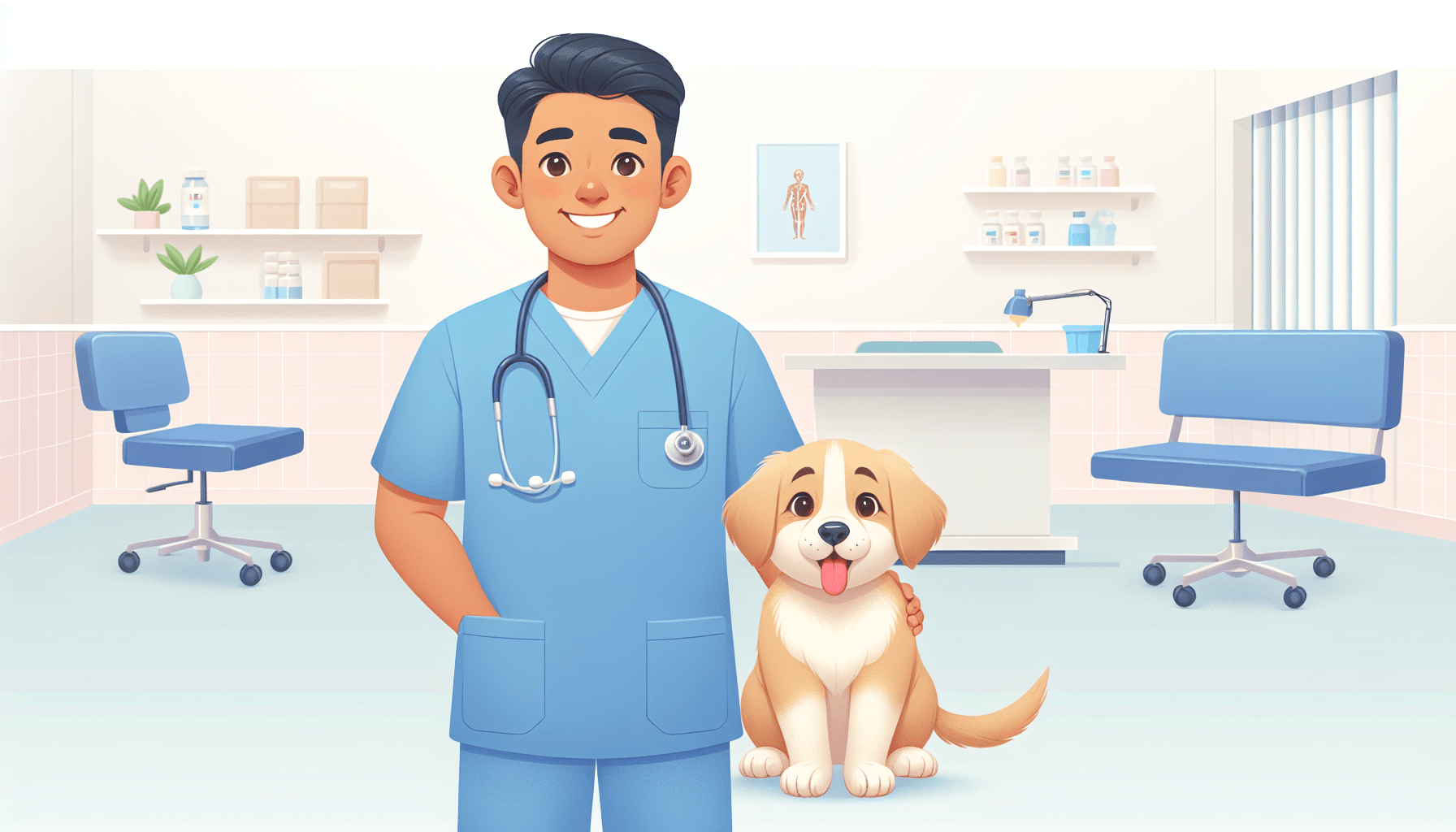So, you’ve finally decided to bring home a new furry friend! Congratulations! Now that you have a pet, it’s important to ensure their well-being by scheduling their first vet visit. But what exactly can you expect during this initial appointment? From thorough examinations and immunizations to discussions about diet and behavior, this article will guide you through what to anticipate during your pet’s first visit to the veterinarian. Rest assured, your furry companion will be in good hands!

Scheduling an Appointment
When it comes to scheduling an appointment for your pet’s first visit to the veterinarian, conducting research on local veterinarians is an important first step. You want to find a reputable clinic with qualified professionals who can provide your pet with the best care possible. Take the time to read reviews, ask for recommendations from friends or family, and check out the clinic’s website to get a sense of their services and specialties.
Once you have selected a veterinary clinic, it’s time to make the call. When calling the clinic, remember to be polite and friendly. The receptionist will ask you a few questions such as your pet’s name, breed, age, and any specific concerns or reasons for the visit. Providing this information will help the clinic staff prepare for your pet’s visit and ensure they allocate enough time for the appointment.
During the call, you will also need to choose a convenient date and time for the visit. Consider your own schedule and availability, as well as any specific instructions from the clinic. Sometimes, certain procedures or examinations require your pet to have an empty stomach, so be sure to ask if there are any special requirements for the appointment. Once you have agreed on a date and time, be sure to mark it on your calendar and make any necessary arrangements to ensure you can be there with your pet.
Preparing for the Visit
Preparing for your pet’s first visit to the veterinarian involves gathering necessary paperwork and bringing your pet’s medical history. This includes any previous vaccination records, details of past illnesses or surgeries, and any medication your pet may be currently taking. Having all these documents ready will help the veterinarian get a comprehensive understanding of your pet’s health and medical background.
In addition to paperwork, it’s a good idea to have a list of questions ready before the visit. This way, you won’t forget to ask any important concerns or seek clarification on specific issues. Write down any behaviors or symptoms you’ve noticed in your pet that you would like to discuss with the veterinarian. This way, you can make the most out of your appointment and ensure that all of your concerns are addressed.
Arriving at the Veterinary Clinic
When you arrive at the veterinary clinic for your pet’s first visit, the first step is to check in at the reception desk. The friendly staff will guide you through the initial paperwork and ask for any necessary information, such as your contact details and insurance information, if applicable. Be sure to provide all the required information accurately, as it will help in efficient communication and record-keeping.
Next, you will be asked to fill out new patient forms. These forms collect important details about your pet, such as their name, age, breed, and existing medical conditions. It is essential to provide precise and complete information to ensure the veterinarian has a comprehensive understanding of your pet’s background.
If you have pet insurance, you will also need to provide the necessary information to the receptionist during check-in. This will allow the clinic to process insurance claims accurately and efficiently.

Meeting the Veterinarian
Once you have completed the check-in process, it’s time to meet the veterinarian. They will introduce themselves and take a few moments to get to know you and your pet. Introducing your pet to the veterinarian in a calm and controlled manner will help your pet feel more comfortable in the veterinary setting.
During this initial meeting, the veterinarian will ask about your pet’s medical history. It is important to provide as much detail as possible, as this will help the veterinarian diagnose any potential health issues or determine the best course of action for your pet’s care. Be sure to mention any medications your pet is currently taking or any recent health concerns or changes in behavior that you have observed.
This is also a good time to go over the list of questions you have prepared. The veterinarian will be glad to address any concerns or provide explanations for any symptoms or behaviors you have noticed in your pet.
Physical Examination
One of the essential aspects of your pet’s first veterinary visit is the physical examination. The veterinarian will carefully examine your pet’s vital signs, such as heart rate, breathing rate, and temperature. These measurements give the veterinarian an initial indication of your pet’s overall health and well-being.
The veterinarian will then assess your pet’s overall health condition. They will look for any signs of abnormalities, such as lumps, skin issues, or signs of pain or discomfort. This comprehensive examination helps the veterinarian detect any existing health problems or potential areas of concern.
During the physical examination, the veterinarian will also examine your pet’s ears, eyes, teeth, and mouth. They will check for any signs of infection, dental issues, or other conditions that may require treatment or further investigation.
Vaccinations and Preventive Care
During your pet’s first veterinary visit, the veterinarian will discuss necessary vaccinations based on your pet’s age, breed, and lifestyle. Vaccinations are essential for preventing various diseases and ensuring your pet’s long-term health. The veterinarian will explain the importance of each vaccination and any potential side effects or risks involved.
In addition to vaccinations, the veterinarian may discuss preventive care options with you. This may include flea and tick prevention, heartworm prevention, or other preventive measures based on your pet’s specific needs. Preventive care is essential to protect your pet from common parasites and diseases, and the veterinarian will provide recommendations tailored to your pet’s individual requirements.
If any vaccinations are required, the veterinarian will administer them during the visit. This ensures that your pet receives the necessary protection against diseases and is up to date with their immunizations.
Diagnostic Tests
Depending on your pet’s symptoms or the veterinarian’s findings during the physical examination, they may recommend diagnostic tests to further investigate any potential health issues. These tests can range from blood tests and X-rays to more specialized procedures such as ultrasounds or biopsies.
The veterinarian will explain the process and cost involved in any recommended diagnostic tests. It is important to ask any questions you may have to fully understand the purpose of these tests and how they will contribute to your pet’s diagnosis and treatment plan. Once you are comfortable with the proposed tests, the veterinarian will proceed with collecting the necessary samples or scheduling the tests.
Treatment and Medication
Following the diagnostic tests, if any health issues or conditions are detected, the veterinarian will discuss potential treatment plans with you. This may involve medication, surgery, or other forms of therapy depending on the specific diagnosis. The veterinarian will explain the recommended treatment options, including their benefits, risks, and potential side effects.
If medication is required, the veterinarian may provide you with different medication options. They will explain how each medication works and guide you in administering the medication correctly. It is vital to ask any questions you may have about the medication, including the dosage, frequency, and potential interactions with other medications your pet may be taking.
Diet and Nutrition
During your pet’s first veterinary visit, the veterinarian will assess your pet’s dietary needs. They may discuss appropriate food choices based on your pet’s breed, age, activity level, and any specific dietary requirements or restrictions. The veterinarian will explain the importance of a balanced diet and how it contributes to your pet’s overall health and well-being.
If you have any concerns or questions about your pet’s diet, this is the time to address them. The veterinarian can provide guidance on feeding schedules, portion sizes, and special diets tailored to your pet’s needs. They can also address any dietary concerns you may have, such as food allergies or weight management.
Follow-up and Next Steps
Before leaving the veterinary clinic, it is important to schedule any necessary follow-up appointments. The veterinarian may recommend further examinations or tests to monitor your pet’s health or adjust the treatment plan. Scheduling these appointments in advance will help ensure that your pet receives the necessary care and that any potential health issues are addressed promptly.
Additionally, the veterinarian will explain any post-visit care instructions you need to follow. This may include administering medication, providing special care for your pet’s recovery, or adjusting their diet or exercise routine. It is important to fully understand these instructions and follow them diligently to support your pet’s healing and overall well-being.
Lastly, during your pet’s first veterinary visit, you will receive contact information for emergencies. This information ensures that you can reach the veterinarian or an emergency clinic if any urgent concerns arise outside of regular office hours. Keeping this information readily accessible will provide peace of mind knowing that help is just a phone call away in case of emergencies.
In conclusion, the first visit to the veterinarian is an essential step in ensuring your pet’s health and well-being. By scheduling an appointment, preparing for the visit, and actively participating in discussions with the veterinarian, you can provide your pet with the best possible care. Remember to ask questions, bring important paperwork, and be proactive in addressing any concerns you may have. With the guidance and expertise of your veterinarian, you can help your pet live a happy and healthy life.

